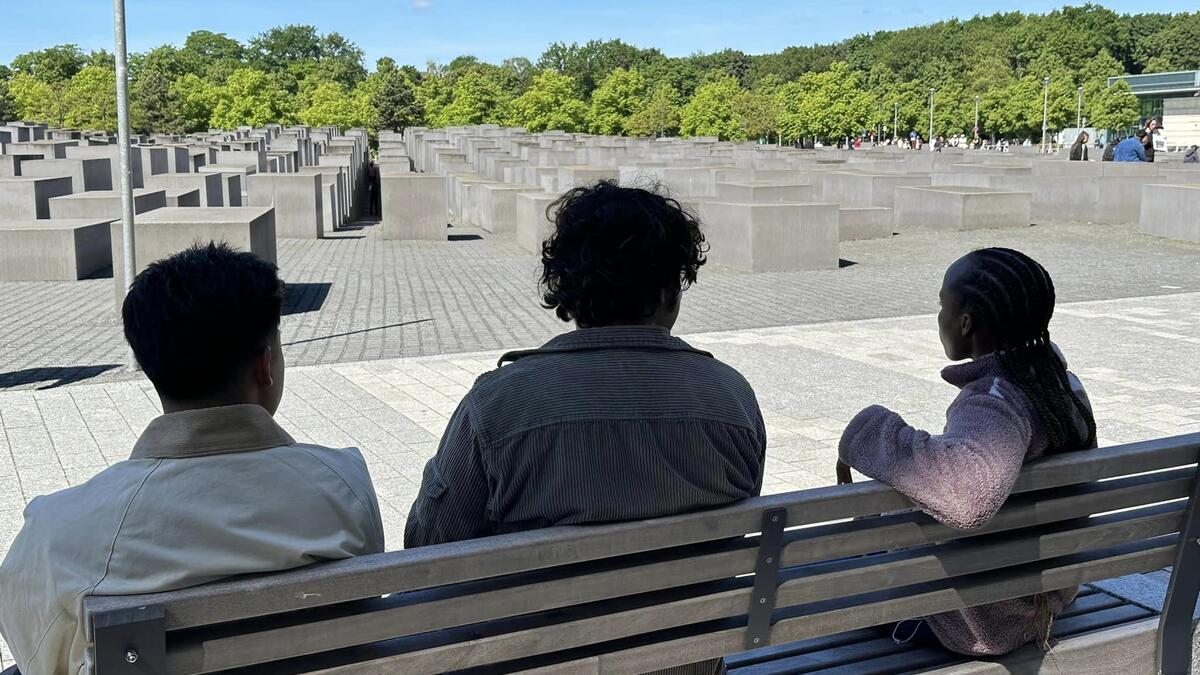Study abroad students expand knowledge of genocide history, the Holocaust

ASU students at the Memorial to the Murdered Jews of Europe. Photo courtesy ASU's School of Social Transformation
Last month, Arizona State University students observed a more somber side of history when they joined the School of Social Transformation for an annual study abroad trip to Berlin, Germany, and Krakow, Poland — the only Holocaust-focused study abroad program at ASU.
This short trip is designed to give students an opportunity to examine their personal experiences while they learn about the history of genocide and the Holocaust.
To support the student’s studies, faculty leads Christine Holman and Erin Schneiderman worked to develop the program and gathered financial gifts from the Riba Family Foundation, the Gretchen Beinecke Charitable Trust and ASU Jewish Studies.
In both Berlin and Krakow, the students attended a variety of museums, memorials and other sites of remembrance, including but not limited to the Jewish Museum, the Berlin Story Bunker, the Sachsenhausen concentration camp, and the grounds of the Plaszow concentration camp.
Throughout the trip, students used the tours to better understand the roots of genocide and why such memorials exist. They spoke with many experts on the subject matter, and at the Galicia Museum, their tour was led by a child survivor, who shared the story of his father, a professor that was murdered in the Holocaust.
At the Harmeze Monastery near the site of the Auschwitz-Birkenau concentration camp, students viewed an art installation by Marian Kołodziej, a former prisoner of Auschwitz, titled "Negatives of Memory: Labyrinths."
“This rendering of the survivor and artists’ work had a profound impact on many of the students,” said Holman, an associate teaching professor at ASU's School of Social Transformation.
Bonnie Wanstreet, an elementary education undergrad, said the most impactful part of the trip for her was visiting Auschwitz.
“To stand where it happened and feel how heavy it is ... being there makes me feel grateful and that I should appreciate the little things more,” Wanstreet said.
To document their memories of the trip, students worked in small groups to take photos and create themes of the experiences like lawlessness, hope, weaponization of architecture, unity and duality in diversity, and more.
"The biggest thing for me was the concept of duality. From darkness to light. As much as there is suffering, there is also a bright light,” said Eleanor Brillo, a career counselor at ASU's School of Geographical Sciences and Urban Planning.
Through collaboration, students from a variety of backgrounds worked together to discuss their themes, find common ground and articulate their different experiences. The faculty leads hope the students will bring this knowledge, care, empathy and renewed interest in civic engagement back to their communities and create change.
Holman said she knows her students will return home with “a more sophisticated understanding of not only how genocides occur, but also how seemingly small or minor acts of dehumanization, discrimination and marginalization can have far-reaching and clearly disastrous results.”
For some students, the trip even helped them discover what they want to do with their future.
"This experience solidified what I want to do," said graduate student Christina Alvarez. "I want to educate the next generation."
More Arts, humanities and education

Award-winning playwright shares her scriptwriting process with ASU students
Actions speak louder than words. That’s why award-winning playwright Y York is workshopping her latest play, "Becoming Awesome," with actors at Arizona State University this week. “I want…

Exceeding great expectations in downtown Mesa
Anyone visiting downtown Mesa over the past couple of years has a lot to rave about: The bevy of restaurants, unique local shops, entertainment venues and inviting spaces that beg for attention from…

Upcoming exhibition brings experimental art and more to the West Valley campus
Ask Tra Bouscaren how he got into art and his answer is simple.“Art saved my life when I was 19,” he says. “I was in a dark place and art showed me the way out.”Bouscaren is an …

